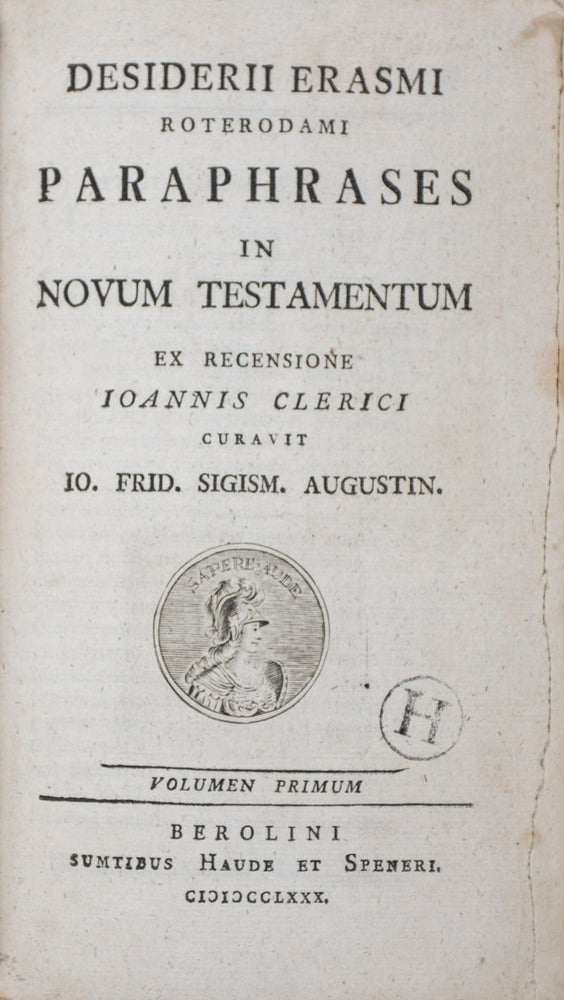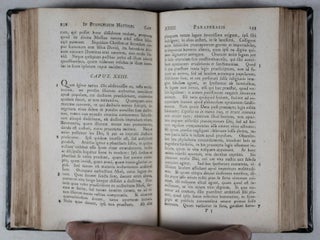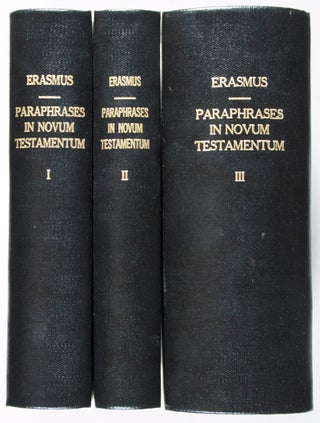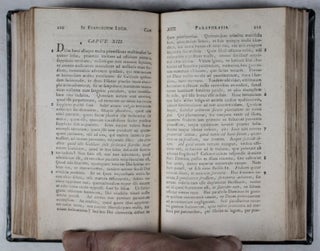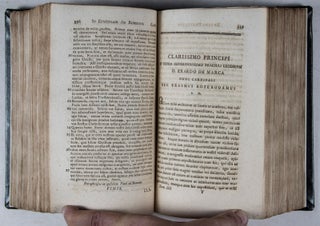Paraphrases in Novum Testamentum. 3-vol. set (Complete)
Berolini (Berlin): Haude et Speneri, 1778 (Vol. 2) - 1780 (Vols. 1 & 3). Later edition. Hardcover. Octavo (8 1/2 x 5"). xxxvi, 546pp (Vol. 1); xxii, 398pp (Vol. 2); xliv, [399]-995, [1]pp. Modern full black cloth, with gold lettering to spines. Title vignettes.
Originally published in 1548, "Paraphrases in Novum Testamentum" were composed between May 1517 and January1524.* They consist of a series of commentaries on every book of the New Testament except "Apocalypse," a book for which Erasmus had no great regard. The Paraphrases were successful beyond expectation and were quickly translated into French, German, English and other languages.
Modern endpapers and fly leaves. Small letter "H" stamped on title pages of first and third volumes. Text in Latin. Bindings and interior in overall very good condition. vg. Item #43177
* The publication history of the "Paraphrases" is complicated. Erasmus began with the Pauline Epistles. The paraphrase of Romans was published in quarto by Dirk Martens in Louvain in November 1517 and reprinted by Erasmus's friend Johann Froben in January of the following year; it sold well and was soon reprinted in octavo. Corinthians was published by Martens in February 1519 and reprinted in Basel by Froben in March; Galatians appeared later that year, with editions from both publishers. The remaining Epistles followed in 1520 and 1521, the last to appear being Hebrews. In the autumn of 1521 Erasmus moved from Louvain to Basel, and from that time Froben published the first editions of the remaining Paraphrases. Erasmus now turned to the Gospels, Matthew appearing in March 1522 (in both folio and octavo - from now on there are no more quartos), John in February (folio) and March (octavo) 1523, Luke in August 1523, and Mark in early 1524 (with a title page dated 1523). Acts followed quickly, the dedication copy being dated February 13, 1524. Froben published a complete edition in two volumes, the first, "a stout octavo volume of 400 leaves dated 1523 and called Tomus secundus," contained the Epistles, and the Tomus primus, containing the Gospels and Acts, appeared the following year. "This was a considerable investment, and the firm kept it in their list for ten years," resetting portions as needed without a change of date. The Paraphrases were reissued in various formats and combinations during the following decades; Roger Mynors writes: "When one is faced with one of these editions in folio, one has to remember that a purchaser would see them as composed of separable parts, out of which sets could be made up in any way that supply might dictate." (For more information, see: R.A.B. Mynors, "The Publication of the Latin Paraphrases," in Robert Dick Sider (ed.), New Testament Scholarship: Paraphrases on Romans and Galatians (Collected Works of Erasmus) (University of Toronto Press, 1984), pp. xx-xxix.)
About the author: Desiderius Erasmus Roterodamus (1466-1536), known as Erasmus or Erasmus of Rotterdam, was a Dutch Renaissance humanist, Catholic priest, social critic, teacher, and theologian. Erasmus was a classical scholar and wrote in a pure Latin style. Among humanists he enjoyed the sobriquet "Prince of the Humanists," and has been called "the crowning glory of the Christian humanists." Using humanist techniques for working on texts, he prepared important new Latin and Greek editions of the New Testament, which raised questions that would be influential in the Protestant Reformation and Catholic Counter-Reformation. He also wrote On Free Will, The Praise of Folly, Handbook of a Christian Knight, On Civility in Children, Copia: Foundations of the Abundant Style, Julius Exclusus, and many other works. (From Wikipedia).
Price: $450.00

